Virtual RCP Workshops Conducted in Tanzania During Pandemic
A cornerstone of the Reaching Children’s Potential Program (RCP) is the series of workshops with mothers who are RCP members, providing essential information on topics related to child development, health, nutrition, hygiene, and technologies. In the absence of volunteers on the ground in Tanzania, Global Volunteers has worked with Regis University in Colorado to facilitate these workshops virtually. Following up on their previous two on-site programs, Regis students and faculty continue the school’s commitment to the RCP Program. Read on to learn about the first three virtual RCP workshops conducted this spring.
A Show of Dedication to RCP Program and Principles
In the year since volunteers were on the ground in Tanzania and to conduct workshops with RCP moms, the RCP Tanzanian staff has continued providing essential services to families in the Ukwega Ward. Throughout the pandemic, RCP Caregivers have made home visits to check on the welfare of mothers and children, but the absence of volunteers has created a void at the RCP Center and throughout the villages.
To help local staff sustain the critical informational support to parents, we offered Regis University students the opportunity to conduct trans-continental workshops online, and were grateful for the administration’s enthusiastic response. Faculty and students worked closely with Global Volunteers U.S. and Tanzanian staff to overcome the unique challenges of the nine-hour time difference and narrow time frame available for attendees and presenters. For safety reasons, the Tanzanian participants must arrive at the RCP Center in Ipalamwa in the afternoon, and leave before sundown to avoid traveling on the dirt roads after dark. Therefore, the students presented the workshops within the small window of time very early in the morning in Colorado to ensure the mothers in Tanzania could be home before dark. The flexibility of Regis students and faculty is a testament to their dedication to sharing their knowledge and compassion!
The workshops, conducted in English and translated to Swahili by Tanzania Technology Manager/RCP Program Coordinator Husna Waziri and RCP Caregiver Supervisor Regina Mhagama, were presented by Susan Wilcinski, Toni Jung-Brack, Colleen Lopp, Michelle Pridgeon, Allyson Spence, Sara Vincelli, and Jean Berliner.
The workshop topics, requested by the RCP families, are produced by healthcare professionals in consultation with Tanzanian RCP staff. The authors are members of Global Volunteers’ RCP Advisory Committee and have served in Tanzania. RCP Advisory Committee Chair Dr. Mindy Lull, associate professor at St. John Fisher College, oversees the workshop series. Dr. Bud Weiner, professor of obstetrics and gynecology at Thomas Jefferson University, leads the family planning workshop. Diane Marsch, a neonatal nurse and infant care specialist as well as a neonatal resuscitation program instructor in Oregon, leads the workshops on exclusive breastfeeding and caring for newborns and infants.
The workshops are recorded so they can be presented throughout the region and the Iringa District on future dates. Of course, in-person workshops which facilitate interaction are preferable, but these recordings enable local staff to offer the training to new RCP families who have not yet participated in workshops. We are so grateful for the time and dedication by everyone involved to make these virtual workshops possible and to continue sharing knowledge with RCP moms in the Ukwega Ward. Plans are to continue recording these workshops until volunteers return to Tanzania, and to record the live workshops for use in between service programs.
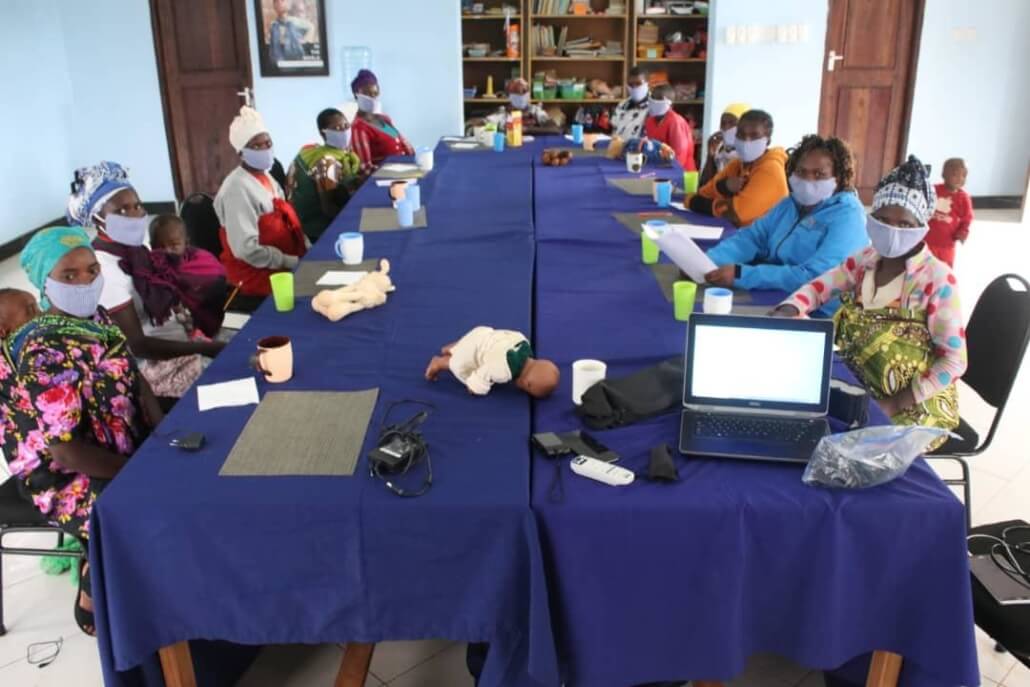
Family Planning Saves Lives and Improves Health
The first virtual workshop in March covered family planning — considered culturally taboo. Access to any type of family planning method in the Ukwega Ward is scarce, and the opportunity for RCP mothers to voice their opinions and questions is critical. For many mothers, the RCP family planning workshop is their first opportunity to learn about contraceptive methods and the reasons to consider limiting their family size.
This workshop explained family planning practices and how it contributes to improved health for children, women, and families. Students on laptops in Colorado and mothers in the RCP Learning Center in Tanzania reviewed the slides, pausing for questions and comments. The mothers learned how having many children or children spaced too closely together can limit their family’s status and quality of life. They were told that family planning helps parents decide when and how many children is best for their future. RCP mothers were invited to consider the wonderful and challenging consequences in building their family – such as cost, joy, effort, happiness, living conditions, and more. They discussed how mothers with smaller, healthier families are likely to have increased opportunities for participation in economic, educational, and social activities.
Additionally, they learned how family planning in general reduces maternal death. Utomo et al. estimates maternal mortality rates in various countries is reduced through family planning by magnitudes of six to 60%, and lowers infant mortality rates as well.
The student and faculty presenters clearly explained pregnancy testing and counseling, preconception health services, sexually transmitted disease, and an overview of some methods of contraception. The mothers were encouraged to discuss what they learned with their healthcare providers, and to investigate these services at the Ipalamwa General Clinic, at family planning clinics, and with their RCP caregivers during regular home visits.
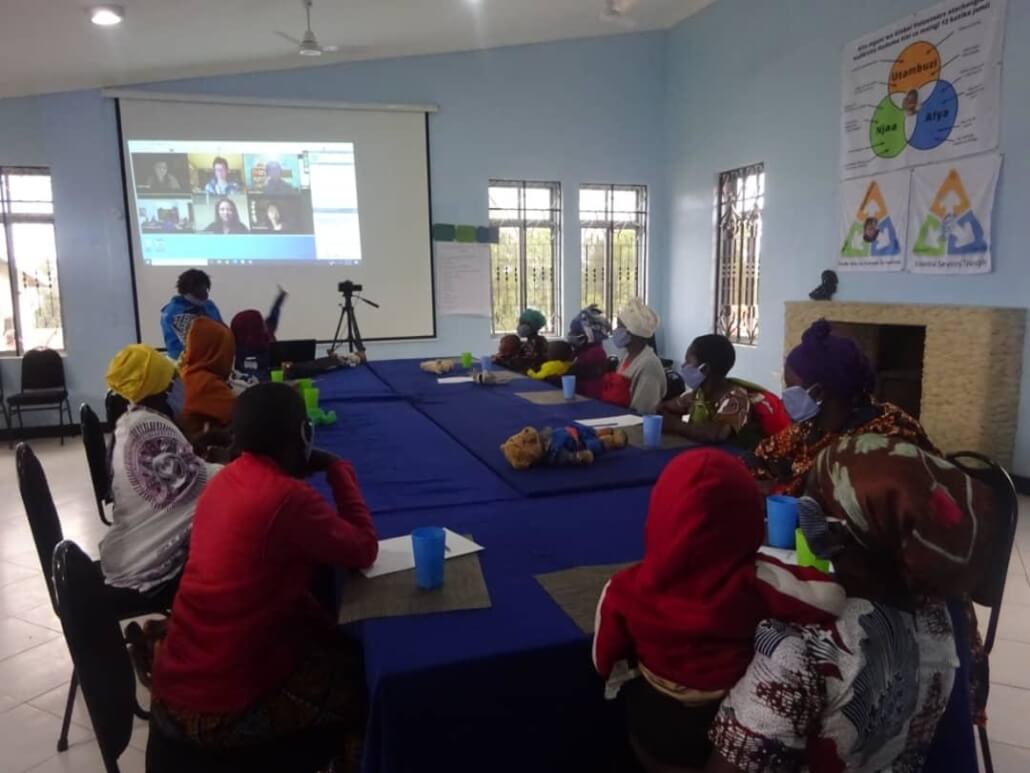
Encouraging Exclusive Breastfeeding from Birth to Six Months
The World Health Organization defines exclusive breastfeeding as “no other food or drink, not even water, except breast milk… for six months of life…” This practice is rare in a culture where mothers often start introducing solid food before their infants are six months old, and RCP encourages mothers to consider exclusive breastfeeding to improve their infants’ growth.
RCP caregivers urge mothers to start breastfeeding in their newborns’ first hours to benefit from the colostrum provided at this time. The second workshop explains bonding between a mother and child during breastfeeding, which reinforces a sense of safety in the infant. The mothers learn how exclusive breastfeeding in the first six months strengthens the immune system, reduces infant mortality from diarrhea and pneumonia, promotes sensory and cognitive development in the critical early post-partum months, and protects against gastrointestinal infection.
Breast milk provides all the nutrients that a baby needs. When feeding an infant foods other than breast milk, the non-human proteins that enter the small openings of the intestine can cause allergies. The workshop identifies signs that a baby is ready for solid foods — such as holding his/her head upright, sitting with support, and showing a desire for food by leaning forward and opening his/her mouth. RCP moms learned how, at six months of age, their babies can be introduced to foods such as mashed banana, avocado, cooked carrots, mango, and cooked potatoes. The frequency of solid food for babies at six, seven, eight, and nine months and beyond are explained, emphasizing that breastfeeding should still continue as well.
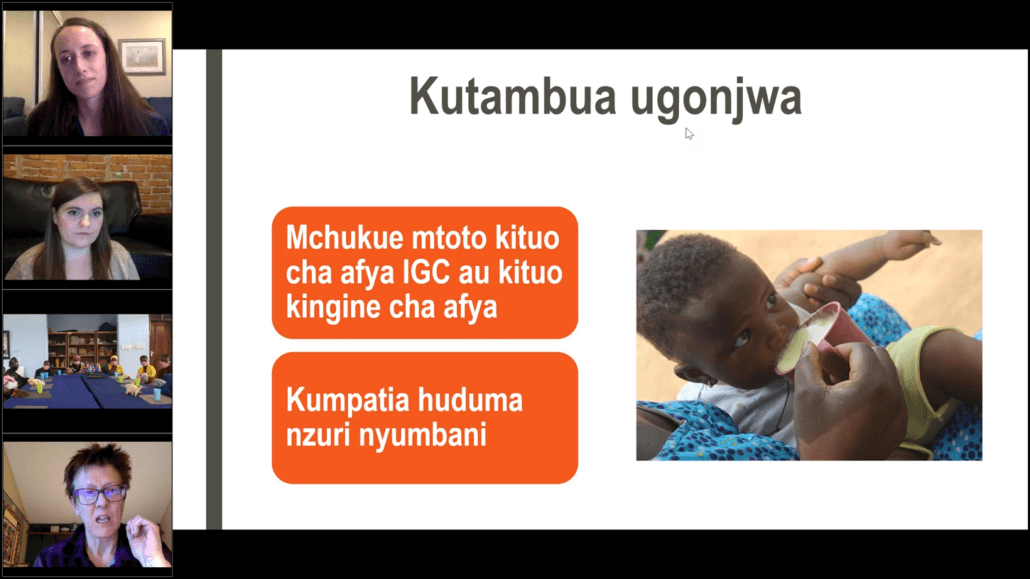
Caring for Newborns and Infants
The third workshop illustrates the risks and signs of illness in the first months of life, and how/when to seek care at the Ipalamwa General Clinic. During this time, babies need their mothers’ care to adapt to life outside of the womb. The faculty and student presenters emphasized the crucial first steps after birth – drying and dressing the newborn to keep him/her warm. Reviewing good nutrition for the mother and baby, the RCP attendees learned how common childhood illnesses such as diarrhea, pneumonia, and malaria are more likely to cause death if children are malnourished.
With a doll and the help of RCP staff, presenters demonstrated how to support the newborn’s head and to swaddle her/him for comfort. The mothers were reminded to wash their hands frequently when handling their babies, and never shake or jiggle them on their knees. The volunteer presenters explained how to recognize when a child is sick, and why vaccinations are important.
Other baby care topics covered were diapering and bathing, providing nutritious food and protecting from illness and injury, demonstrating love and affection, and playing and communicating. How the infant’s brain develops in the first two years of life was explained – and during this time, play helps them think, test ideas, and solve problems.
Testimonials from RCP Moms
Tanzania RCP Caregiver Supervisor Regina Mhagama says she was thrilled to see that RCP moms were engaged and “got a lot” out of the virtual workshops. “The moms are learning, asking questions, looking at the presenters, and interacting as if they were right here in Tanzania.” Regina emphasizes the importance of exposing RCP families to different ways of receiving information during the pandemic.
RCP mom Hekida Kasuga attended the workshop on caring for infants and newborns and says, “I joined the RCP Program when it began in July 2017 and I had never experienced anything like this. It was so wonderful to see the presenter on the projector. I heard what they said and I understood the content of the workshop very well. Also, I was so impressed to hear the examples provided by presenters. It was great to know more about how to take care of newborns and it covered the important information moms need to apply with their children. If the volunteers cannot come soon, Global Volunteers should continue with these presentations.”
RCP mom Anjelista Kikoti says, “I learned so many important things about how to take care of children. This was my first time learning about choking, constipation, and how to wash babies. I’m pregnant now and I hope to apply the skills I learned in the workshop today to my newborn.”
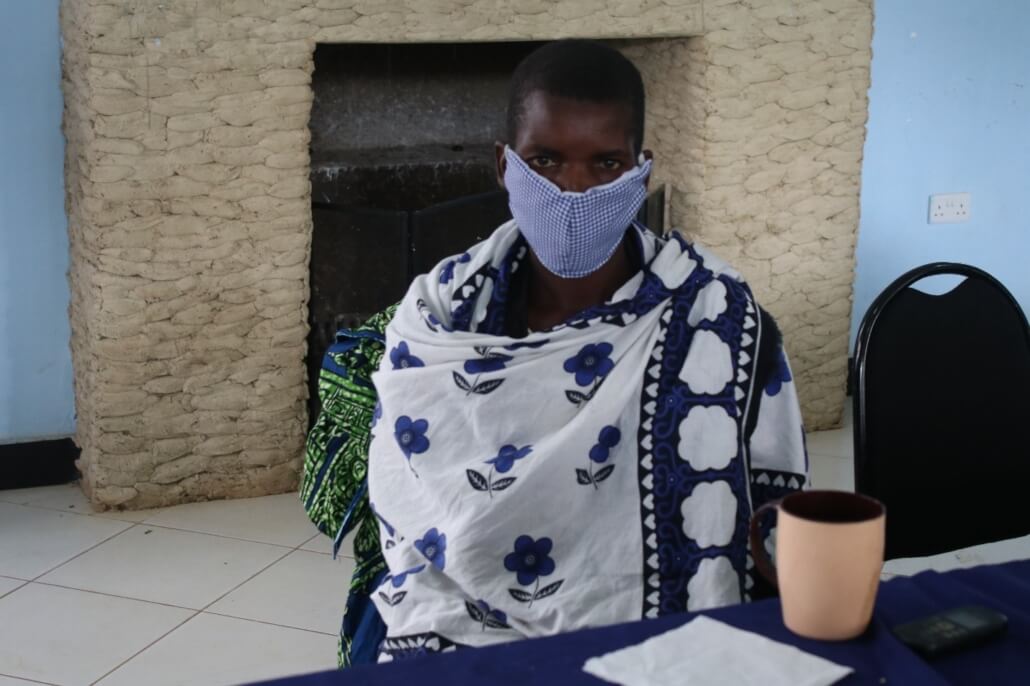
RCP mom Hekida Kasuga said she had never experienced anything like the virtual workshop on caring for infants and newborns, and that this is a project Global Volunteers should continue. 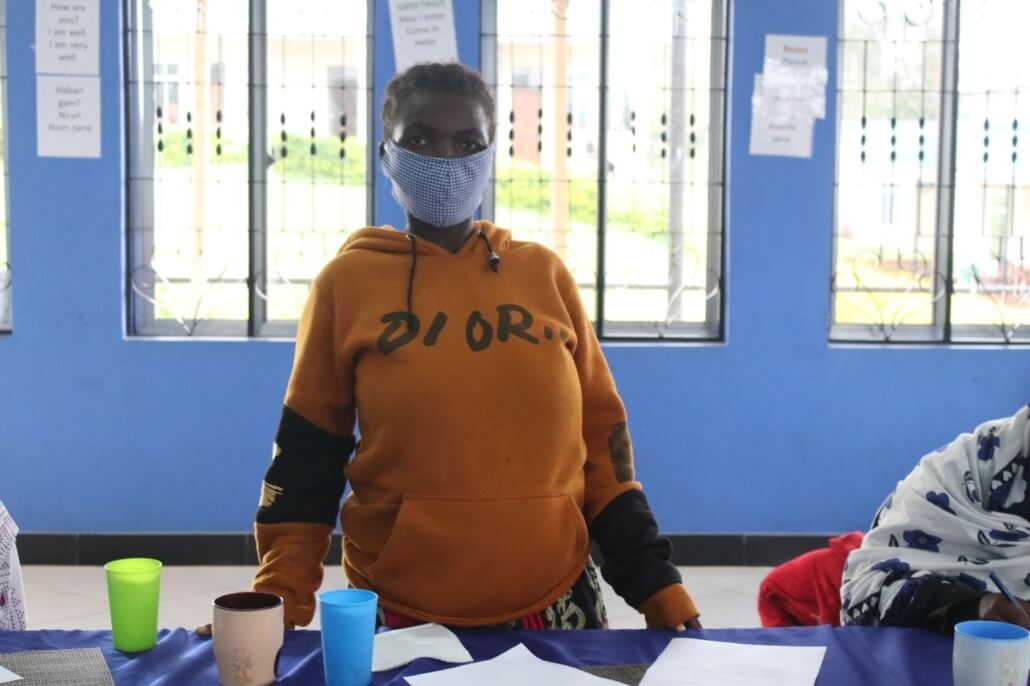
Anjelista Kikoti is expecting and hopes to apply the knowledge she gained through the workshops with her new baby.
Most importantly, health and nutrition workshops have contributed to a dramatic reduction in childhood stunting. Of all children who were stunted when first enrolled in the program in 2017, 62% were not stunted after 18 months. Overall, stunting decreased from 37.4% to 30%, and severe stunting decreased from 20% to 7.5% in the RCP villages. “I’m happy that I got a chance to learn all this important information,” said RCP Mother Rebecca Mbilinyi, “because I know I will help my generation, meaning my children and grandchildren, and hopefully it will continue for generations after that.”
More than 30 additional workshops are planned for 2021. By continuing the virtual learning/volunteering during the summer months, we hope to sustain continuity of instruction for RCP moms year-round. Health care and nutrition professionals are welcome to participate in this project. Interested volunteers can email info@globalvolunteers.org to learn more about this exciting virtual project.

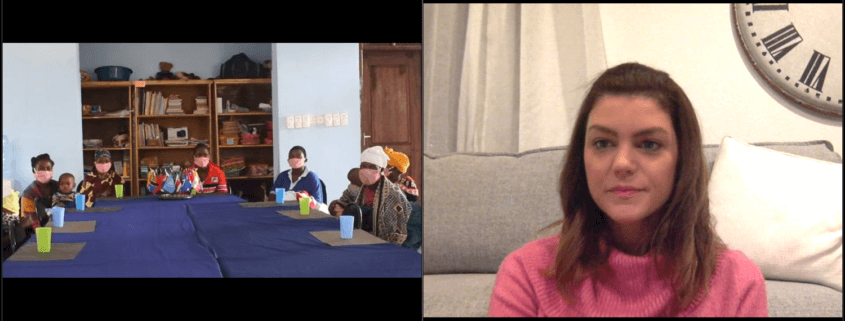
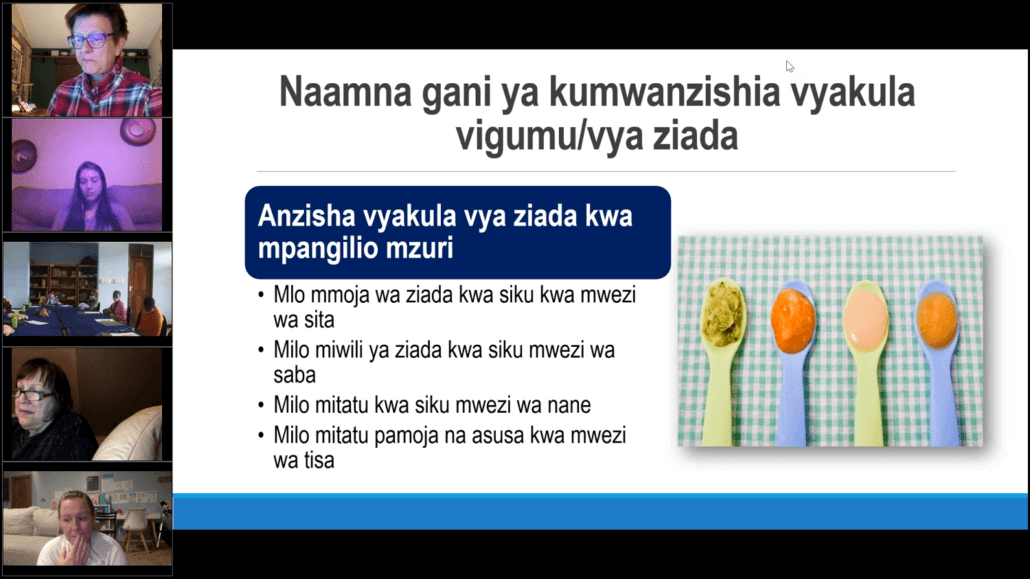


Leave a Reply
Want to join the discussion?Feel free to contribute!